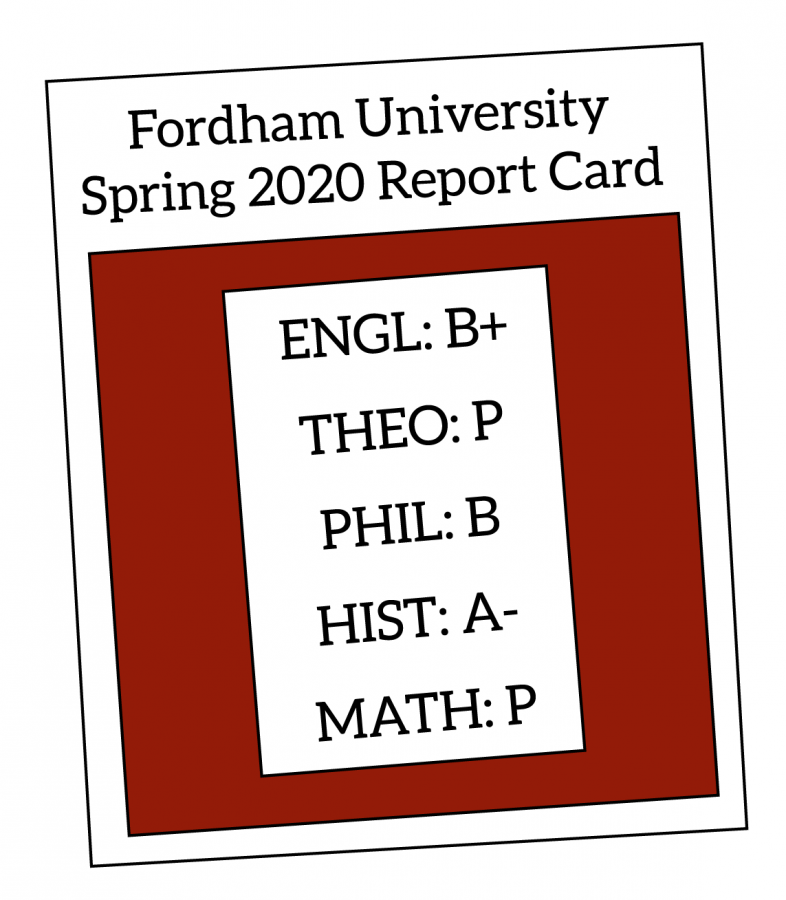Students Submit Pass/Fail Requests Prior to Finals
April 28, 2020
More than 8,200 students issued a pass/fail request by the April 24 deadline, according to Fordham College at Lincoln Center (FCLC) Dean Laura Auricchio.
At the beginning of the remote learning period, the previous pass/fail deadline, which only applied to elective courses, had already passed. However, due to the unprecedented circumstances of the pandemic, the undergraduate deans worked together and decided that students should have the option to pass/fail all courses as the added stress would affect all classes, not just electives, Auricchio said.
“I think that the principles that underlay where we landed were that we should give students sufficient time to see how things were going after they switched into remote mode and we thought a full month was a good chunk of time. By then you would know either I’m disrupted or I’m not disrupted,” Auricchio said.
Jessica Yu, FCLC ’23, decided to make two classes pass/fail based on this disruption. Yu added that she had a hard time focusing on these two classes even before remote learning began and feared they would bring down her GPA, so deciding on pass/fail became the best solution for her.
Professors also did their best to help with the transition to remote learning, and this was a key factor in the decision Ritamarie Pepe, FCLC ’22, made in keeping the letter grades of her classes. Pepe explained that her professors edited their syllabi in an effort to prevent added stress, which helped ease her mind.
“If my professors hadn’t done this, I probably would have considered using the Pass/Fail option in order to manage struggles with mental health during all this fear and uncertainty,” Pepe said.
Finley Peay, FCLC ’20, had a different experience with some professors, which became a reason for her to utilize pass/fail. One professor, Peay said, encouraged most seniors to take advantage of the pass/fail opportunity, while another did not see a purpose in the pass/fail option, disregarding the unusual circumstances.
Despite student petitions and an April 23 email from the United Student Government to extend this deadline until after students received a final grade, the administrators of Fordham’s undergraduate colleges were all in agreement that the deadline was where it needed to be.
Kiya Brown, FCLC ’23, said that with the transition to online learning, her professors have not input grades as quickly, so she had to guess what her grades would look like in making decisions before finals.
Adah Unachukwu, FCLC ’23, agreed with Brown. “We won’t know how badly we’ve been affected by all of this until the final exams, which tell us whether the learning we did in the past term was sufficient,” Unachukwu explained.
The reason the deadline was set before final grades came out is that the university did not want to create a stigma around pass/fail grades.
“The consensus view was that if Pass/Fail were awarded after students saw their grades, then the only students who would elect Pass/Fail would be those who got relatively poor grades,” Auricchio said.
The university wanted to prevent the association of a “pass” grade with a lower letter grade. “It’s just a Pass, there’s no value judgment based into it,” Auricchio explained.
Unlike Columbia University, which made pass/fail mandatory, the Fordham administration decided on an optional pass/fail policy because students were also lobbying to keep grades, according to Auricchio. The optional pass/fail was also implemented in other NYC schools, yet the deadlines for this decision vary.
Similar to Fordham, the deadline for pass/fail at Pace University was April 27, before their final exams. At the City University of New York, students have 20 business days after final grades are due to request pass/fail, the dates for which vary depending on the timeline of the class.
To help her students gain perspective on what option to choose before finals, Fordham English professor Elisabeth Frost wanted to make sure her students were aware that their mental health was a priority at this time.
“The choice is still in the students’ hands, and I’m just really, really grateful the University has embraced this option. The more options the students have, the better at this point,” Frost said.
“My own feeling is that self-care and mitigating stress are the most important things in everyone’s lives right now,” she added.
Stephanie Polakowski, Gabelli School of Business at Lincoln Center ’22, was studying abroad at the London Centre this semester. The pass/fail option was extended to certain study abroad programs, and Polakowski is grateful to be given the option.
“If nothing else it at least helps alleviate a small amount of stress during this super stressful and uncertain time,” Polakowski said.
Other students are utilizing pass/fail to relieve stress about making arrangements to return to New York in the fall. Already accepted into a graduate program, Peay knew she did not need to keep the letter grades and wanted to focus on the transition back to New York from California.
With the option of pass/fail, there is no way to keep a letter grade on record for future purposes, such as applying to graduate programs, Auricchio said. “In an ideal world, that’s what we would have wanted. But apparently it’s not possible, I’m not sure if it’s because of the system that we have or the variation of the system that we have, but it was something more technical than I can really comprehend. In this case, at Fordham, the letter grade will not be preserved anywhere.”
After doing her own GPA calculations, Savanah Manos, FCLC ’20, decided to keep the letter grades because none of her classes seemed to affect her GPA negatively. Also attending graduate school next year, Manos took a different approach from Peay in deciding that keeping the letter grade could possibly help her transcript in the transition to a graduate program.
Brianna Doucette, FCLC ’23, wanted to keep her letter grades for graduate program applications later in her Fordham career. With plans to go to law school, Doucette decided that since her grades appeared to help her GPA, it was better to keep them than to go pass/fail.
The technicalities of pass/fail stretched across virtually every unit of the university, according to Auricchio. This started with all undergraduate colleges working in conjunction to make sure all students had the same available options and stretched further into other departments as the conversation continued.
“This actually took a lot of behind the scenes work by Academic Records and IT. They had to be a big part of the conversation too to be sure we could actually, literally do it,” Auricchio said. “We also had to speak to Financial Aid because there are potential Financial Aid implications. We had to speak to international students because of potential visa implications. Every unit of the University was involved.”
As shown in the decision to offer pass/fail, the most important thing that administrators agreed on in these uncertain times is putting mental health first, as Chair of English Mary Bly emphasized.
“Let’s be kind to ourselves. If you adore a class and you’re acing it, fabulous. If you are staggering on, pretty sure that a class you loved is now your least favorite, opt for Pass/Fail,” Bly said. “It’s not a failure. It’s simply a recognition that the world is turned upside-down.”














